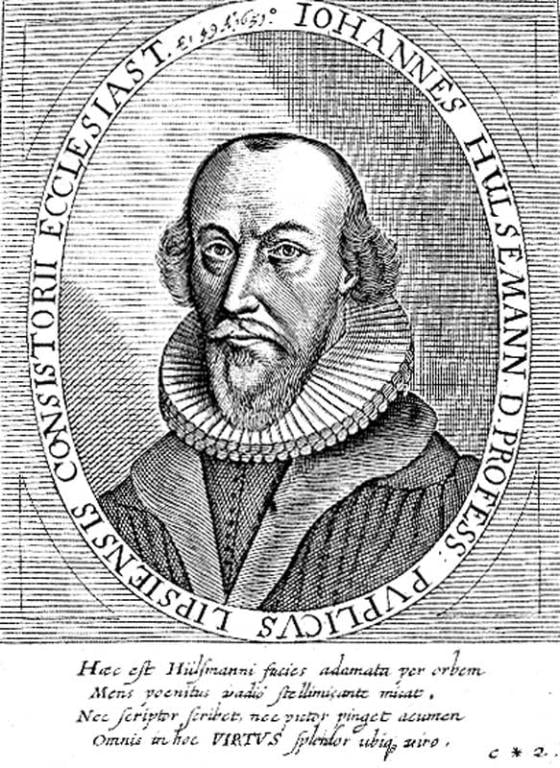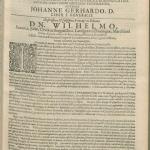
Johann Hülsemann (1602-1661) was a German Lutheran theologian and one of the most eminent Lutheran scholastics. In 1646 he became professor of theology at Leipzig, and served as pastor of St. Nicholas Church in town. He was excellent in the field of systematic theology, and during his lifetime many regarded him as the leader of German Lutheranism. I will be critiquing many parts of his book, Extensio brevarii theologiae [Extension of the Brevarium of Theology, 555 pages, Leipzig, 1655], which is available online in Latin. For translation I use Google Translate, with a few of my own edits for clearer English. My two replies will be filed under Hülsemann’s name on my Lutheranism web page. His words will be in blue. I use RSV for Bible citations.
*****
Traditions that are not written, either deliver a different and new object, not expressed in the Bible, or interpret and explain a dogma already delivered in the Bible. Insofar as they differ from the text which they explain, they are not an object of false faith, nor do they generate faith, divine, nor are they derived from divine faith, nor are they allowed to embrace them with the same affection of piety, which is necessary to embrace the dogmas revealed by God in the Bible.
This is too negative towards tradition, according to the Bible itself, which has many passages suggesting that tradition can and does pass down apostolic doctrine and truth alongside — and in harmony with — the written Bible. Here are eleven examples:
1 Corinthians 2:1, 4, 13 When I came to you, brethren, I did not come proclaiming to you the testimony of God in lofty words or wisdom. . . . [4] and my speech and my message were not in plausible words of wisdom, but in demonstration of the Spirit and of power, . . . [13] And we impart this in words not taught by human wisdom but taught by the Spirit, . . .
1 Corinthians 11:2 I commend you because you remember me in everything and maintain the traditions even as I have delivered them to you.
Philippians 4:9 What you have learned and received and heard and seen in me, do; and the God of peace will be with you.
1 Thessalonians 2:13 And we also thank God constantly for this, that when you received the word of God which you heard from us, you accepted it not as the word of men but as what it really is, the word of God, which is at work in you believers.
2 Thessalonians 2:15 . . . stand firm and hold to the traditions which you were taught by us, either by word of mouth, or by letter.
2 Thessalonians 3:6 Now we command you, brethren, in the name of our Lord Jesus Christ, that you keep away from any brother who is living in idleness and not in accord with the tradition that you received from us.
2 Timothy 1:13-14 Follow the pattern of the sound words which you have heard from me . . . [14] guard the truth which has been entrusted to you by the Holy Spirit who dwells within us.
2 Timothy 2:2 And what you have heard from me before many witnesses entrust to faithful men who will be able to teach others also.
Hebrews 2:1 Therefore we must pay the closer attention to what we have heard, lest we drift away from it.
1 Peter 1:25 “but the word of the Lord abides for ever.” That word is the good news which was preached to you.
1 John 2:24 Let what you heard from the beginning abide in you. If what you heard from the beginning abides in you, then you will abide in the Son and in the Father.
“Please Hit ‘Subscribe’”! If you have received benefit from this or any of my other 5,000+ articles, please follow my blog by signing up (with your email address) on the sidebar to the right (you may have to scroll down a bit), above where there is an icon bar, “Sign Me Up!”: to receive notice when I post a new blog article. This is the equivalent of subscribing to a YouTube channel. My blog was rated #1 for Christian sites by leading AI tool, ChatGPT: endorsed by influential Protestant blogger Adrian Warnock. Actually, I partner with Kenny Burchard on the YouTube channel, Catholic Bible Highlights. Please subscribe there, too! Please also consider following me on Twitter / X and purchasing one or more of my 55 books. All of this helps me get more exposure, and (however little!) more income for my full-time apologetics work. Thanks so much and happy reading!
***
Hülsemann assumes, with no biblical warrant whatsoever, the notion of inscripturation, in which every true extrabiblical tradition must needs be and is in fact eventually incorporated into the Bible. Failing that, it would be invalid and illegitimate. The only problem is that the Bible nowhere teaches this principle. It’s a Protestant tradition of men (hence fallible and not certain). In most cases, legitimate apostolic extrabiblical traditions further explain or develop ideas and doctrines that are implicit in Scripture or otherwise in harmony with it (or not contradictory to anything in the Bible).
As an example, take infant baptism (where Lutherans agree with us). St. Augustine said that this couldn’t be found in the Bible, but was nevertheless true, because the Church fathers widely taught it, so that it was to be regarded as apostolic tradition. I maintain, on the other hand, that it is implicit in the Bible, in passages that describe the baptism of entire households, and in the analogy to circumcision, that St. Paul drew in Colossians. Either, surely nothing in the Bible totally prohibits the practice. So we can say that it’s in harmony with Holy Scripture.
Hülsemann cites Deuteronomy 12:32, which reads, “Everything that I command you you shall be careful to do; you shall not add to it or take from it.” I agree that this has primary reference to the Mosaic Law, in context. But I think it also can be interpreted as a broader statement: whatever God commands, period, whether in the written law or through a prophet or in a vision, etc., we must obey. Even if I’m wrong, and it refers only to the Law, elsewhere, God’s commands extend further than the written law in the Bible:
1 Samuel 16:1, 4 The LORD said to Samuel, “How long will you grieve over Saul, seeing I have rejected him from being king over Israel? Fill your horn with oil, and go; I will send you to Jesse the Bethlehemite, for I have provided for myself a king among his sons.” . . . [4] Samuel did what the LORD commanded, and came to Bethlehem.
2 Samuel 5:23-25 And when David inquired of the LORD, he said, “You shall not go up; go around to their rear, and come upon them opposite the balsam trees. [24] And when you hear the sound of marching in the tops of the balsam trees, then bestir yourself; for then the LORD has gone out before you to smite the army of the Philistines.” [25] And David did as the LORD commanded him, and smote the Philistines from Geba to Gezer. (cf. 5:19)
Jeremiah 1:7 But the LORD said to me [Jeremiah], “Do not say, ‘I am only a youth’; for to all to whom I send you you shall go, and whatever I command you you shall speak.
Jeremiah 26:8 . . . Jeremiah had finished speaking all that the LORD had commanded him to speak to all the people . . .
Ezekiel 37:1, 4, 7 The hand of the LORD was upon me [Ezekiel], and he brought me out by the Spirit of the LORD, and set me down in the midst of the valley; it was full of bones. . . . [4] Again he said to me, “Prophesy to these bones, and say to them, O dry bones, hear the word of the LORD. . . . [7] So I prophesied as I was commanded;
Matthew 28:19-20 Go therefore and make disciples of all nations, baptizing them in the name of the Father and of the Son and of the Holy Spirit, [20] teaching them to observe all that I have commanded you . . .
1 Corinthians 14:37 If any one thinks that he is a prophet, or spiritual, he should acknowledge that what I am writing to you is a command of the Lord.
Nor is there any need for another new revelation, or miracle, to confirm that this spirit of the revealed word is true, and consistent with the mind of the Revealer. For the intrinsic power of the word, because it is divine, makes faith in the hearer or to the reader not foolishly probable, but also infallible.
It doesn’t follow that there is no other infallible source of truth (not identical to “revelation”) besides the Bible, because the Bible is infallible. I just provided several examples of extrabiblical infallible commands directly from God. All such examples prove that sola Scriptura is false.
They did not understand what was said in the parable of the sower, but Jesus opened it to them, so that they might understand the scriptures.
Jesus told the parable of the sower (Mt 13:3-9), then He explained it to His disciples (13:18-23), who had “asked him what this parable meant” (Lk 8:9), which proves that they didn’t understand it on their own. Then Jesus told the parable of the weeds (Mt 13:24-30), and afterwards “his disciples came to him, saying, ‘Explain to us the parable of the weeds of the field'” (13:36) and He did so (13:37-43).
The parallel account in Mark states, “when he was alone, those who were about him with the twelve asked him concerning the parables” (Mk 4:10) and “privately to his own disciples he explained everything” (4:34). This expressly contradicts the notion of the perspicuity (clearness) of the Bible without authoritative interpretation. So Hülsemann makes our argument for us here.
No one can evangelize except and beyond what has already been evangelized, Apoc. XXII, 18; Nothing can be added to what is written. Against the pontifical enthusiasts.
That text says, “I warn every one who hears the words of the prophecy of this book [i.e., Revelation alone, not the whole NT]: if any one adds to them, God will add to him the plagues described in this book”. It doesn’t address the completely separate issue that Hülsemann pulls out of a hat. This is what is called eisegesis: improperly extracting out of a biblical text what in fact is not there. No one can add words to the book of Revelation. It’s complete. It doesn’t follow from that, that no one can evangelize in ways that expand upon what is in Revelation, or even in the New Testament as a whole.
I stated in my most recent video, on sola Scriptura, that the use of YouTube in order to spread Catholic teachings — just like radio and TV before it — is not specifically in the Bible, but it’s perfectly consistent with it, and is an application of St. Paul’s evangelistic principle, “I have become all things to all men, that I might by all means save some” (1 Cor 9:22).
Whatever the prophets speak, and write, by the inspiration of the Holy Spirit speak & write. Against the Pontiffs.
Just because popes are not inspired (papal encyclicals are not Scripture, in other words), it doesn’t follow that they don’t possess the far lesser gift of infallibility (and that’s what sola Scriptura denies). So this proves nothing with regard to Protestant-Catholic disputes, since we never claimed that popes were inspired in the first place. They are equipped by the Holy Spirit to at times infallibly interpret the inspired revelation of Scripture, in a way that the layperson cannot do.
From the institution of God, and the condition of the Church after Christ’s birth, it was necessary that the Word of God should be set in writing, And whatever the prophets and apostles left written, was done by the help of God, Jer.XXXVI.2: The word of the Lord came to Jeremiah, saying: Take the roll of the book, and write. Hab.II.2. And the Lord said to me, Write and set it upon a table, that all that pass by may read!
None of this proves that the entirety of the “Word of God” — which term in the Bible refers to oral prophetic or apostolic proclamation far more times than to the Bible — was committed to writing. He again simply assumes without proof in the Bible, the idea of “inscripturation.” If we want to be truly biblical, we can’t simply assume that whatever we wish to be in the Bible (due to our prior man-made tradition) is present there, when in fact it is not. That makes a mockery of God’s revelation, to treat it in such cavalier fashion.
We know that the prophet Jeremiah survived the destruction of Jerusalem in 587 BC and that He was again told by God after that sad event (as in Jer 36: 2, cited by Hülsemann) to “Write in a book all the words that I have spoken to you” (Jer 30:2). But of course that only applies to Jeremiah. It doesn’t follow that all the prophets or other writers of the Bible like Moses and David and Solomon wrote down absolutely everything that God told them, so that no oral traditions remained apart from Scripture, in harmony with it.
The prophet Habbakkuk was told by God to “Write the vision” (2:2), but this refers to one “oracle of God which Habak’kuk the prophet saw” (1:1). That tells us nothing about other possible visions that he saw, or revelations that he heard. We simply don’t know if he wrote them all down. His book is only three chapters long. It’s quite reasonable and plausible to presume that he proclaimed many more things than that, and that his life’s work as a prophet did not consist in writing three chapters of the Bible, which could have been done in one day. So this is — as always — a very weak proof of supposedly “no oral tradition” and inscripturation and sola Scriptura. The inspired Bible, after all, stated even about Jesus: about Whom we know a lot:
John 20:30 Now Jesus did many other signs in the presence of the disciples, which are not written in this book;
John 21:25 But there are also many other things which Jesus did; were every one of them to be written, I suppose that the world itself could not contain the books that would be written.
What is true about Jesus is almost certainly also true of the prophets and other writers of Scripture. Therefore, oral tradition is not at all disproven by what we know in Holy Scripture, and these two passages by themselves disprove “inscripturation.”
*
Practical Matters: I run the most comprehensive “one-stop” Catholic apologetics site: rated #1 for Christian sites by leading AI tool, ChatGPT — endorsed by popular Protestant blogger Adrian Warnock. Perhaps some of my 5,000+ free online articles or fifty-six books have helped you (by God’s grace) to decide to become Catholic or to return to the Church, or better understand some doctrines and why we believe them.
*
***
*
Photo credit: Johann Hülsemann: portrait by Jean-Jacques Boissard [public domain / Wikimedia Commons]
Summary: I critique arguments for sola Scriptura from the German Lutheran scholastic theologian, Johann Hülsemann (1602-1661), found in his 1655 book, “Extensio brevarii theologiae“.













